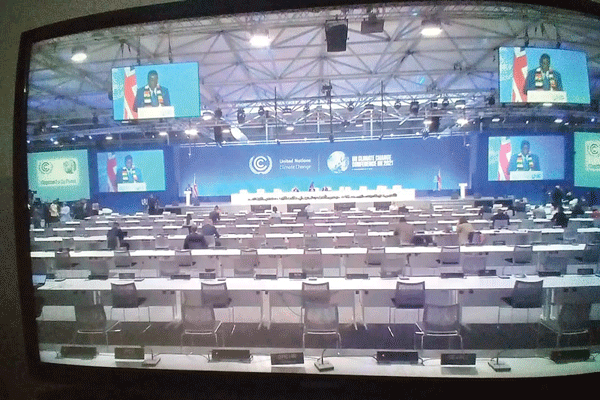
BY MIRIAM MANGWAYA PRESIDENT Emmerson Mnangagwa yesterday addressed an almost empty auditorium at the Climate Change (COP26) summit in Glasgow, Scotland.
Mnangagwa made his address before empty seats, as did all the leaders who delivered their addresses during the 9am to 1pm slot.
Over 120 heads of State and 25 000 delegates are attending the summit.
As Mnangagwa was addressing, scores of United Kingdom-based Zimbabweans were picketing outside the conference room, denouncing him over the country’s bad human rights record, while others extolled him for his re-engagement efforts in the face of adversity.
This is not the first time Mnangagwa has addressed an empty auditorium.In September 2019, he addressed a near empty 1 800-seater auditorium at the 74th United Nations (UN) General Assembly in New York.
It is not customary that State Presidents would address packed auditoriums as many leaders would be following proceedings from other venues or attending other ongoing events elsewhere.
In his address yesterday, Mnangagwa said Zimbabwe was battling the effects of climate change which had resulted in severe droughts and cyclone-induced floods.
“It is most unfortunate that the impact of climate change is disproportionately borne by vulnerable communities that have contributed the least to the current stock of atmospheric carbon,” he said.
- Chamisa under fire over US$120K donation
- Mavhunga puts DeMbare into Chibuku quarterfinals
- Pension funds bet on Cabora Bassa oilfields
- Councils defy govt fire tender directive
Keep Reading
“Vulnerable countries must, therefore, be capacitated to mitigate, adapt and build resilience to climate change. The expectation is that the major emitters will scale up mitigation action and show greater interest in adaptation.
“Decisions at this COP26 should strengthen the implementation of current nationally determined contributions.
“It is further imperative that the set emission reduction targets are anchored on supporting, financing and equipping countries to gradually and sustainably migrate from fossil to renewable energy.”
He added: “Notwithstanding that as a country we are ‘a net sink’, I am pleased to highlight that Zimbabwe has revised its nationally determined contributions, a committed conditional 40% per capita greenhouse gas emissions reduction target by 2030.
“Comprehensive strategies are being implemented towards mainstreaming climate change adaptation and resilience across all sectors of our economy.”
Mnangagwa repeated the call for the lifting of sanctions.
Social media users reacted differently to Mnangagwa’s address, with some saying he did not deserve an audience at the climate change summit since his government was contributing to environmental hazards.
Mnangagwa’s government has been widely criticised for approving the construction of houses on wetlands and unsustainable mining activities, particularly by Chinese companies, with detrimental effects to the environment.
Presidential spokesperson George Charamba, posting on his @Jamwanda2 Twitter handle, said there was nothing untoward about the empty auditorium during Mnangagwa’s address.
“Absolute confusion in terms (of) who the audience for UN summits are,” he said.
“The unschooled think the audience is in the immediate auditorium of delivery. Quite sad, embarrassing in fact!!!!”
Meanwhile, opposition MDC alliance leader Nelson Chamisa said his party had a clear climate change policy that spoke to the creation of new jobs in renewable energy industries.
“To reduce the frequency of extreme weather shocks like cyclones, bold acceleration towards more sustainable methods of generating energy, manufacturing goods, transportation, urban development, and farming need to be taken by all countries. Net zero emissions by 2050 is the target,” Chamisa said in a statement.
“As the next government, our climate change policy is clear. While the journey to net zero by 2050 appears daunting, it represents a unique opportunity for Zimbabwe to create new jobs in new industries like renewable energy, electric vehicles, smart farming and green manufacturing.”
Follow Miriam on Twitter @FloMangwaya











